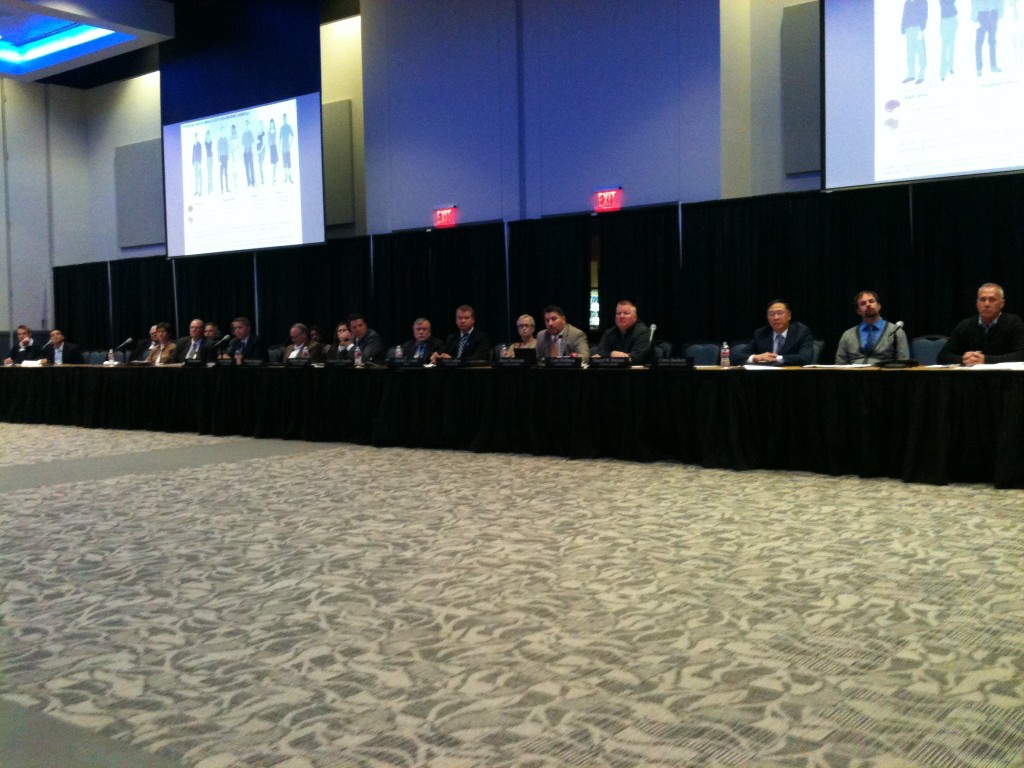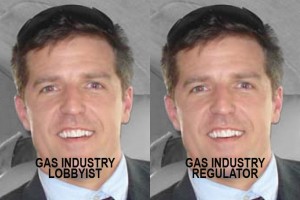Posts Tagged ‘Stephen Lindsey’
Building Momentum in Mansfield
 Good things come in threes. Lance Irwin, Erick Orsak, and Tamera Bounds proved that again on Wednesday night when they led the Mansfield Gas Well Awareness contingent during the Mansfield City Council's "work session" on rewriting the city's gas drilling ordinance.
Good things come in threes. Lance Irwin, Erick Orsak, and Tamera Bounds proved that again on Wednesday night when they led the Mansfield Gas Well Awareness contingent during the Mansfield City Council's "work session" on rewriting the city's gas drilling ordinance.
Combined, they projected just the right mix of competence, skepticism, and experience to combat the "Don't worry, be happy" approach of the Railroad Commission and Texas Commission on Environmental Quality presentations that preceded them in the agenda.
(By the way did you know, that according to Austin, the average response time of a TCEQ inspector responding to a complaint was only 5 hours? Downwinders at Risk is willing to pay $100 to the charity of the inspectors' choice if anyone out there has ever gotten a response that quickly. After almost 30 years of dealing with state environmental agencies, we can't recall a single instance where it took less than a day for an inspector to show up, even when the situation was "urgent.")
By putting the three residents in the same horseshoe as industry, state agencies, and itself, the Council elevated the status of the resident's group beyond anything it had enjoyed in previous rounds of jousting over drilling. Whether that leads to the kinds of substantial changes to the city's drilling ordinance the group is pursuing remains to be seen.
What was obvious after the formal presentations ended and a more informal question and answer period followed was the large disparity in monitoring and self-regulation within the industry. There were at least 10 or 12 gas operators sitting at the table during the event. Conspicuous by its absence was Eagleridge, the source of many complaints in Mansfield and of course, the company that ignited the Denton fracking vote controversy.
But Eagleridge's Chief Operating Officer Mark Grawe was present, in the back of the room, trying to keep a low profile. It didn't work. Let's just say when you get called on the carpet by Stephen Lindsey, the Mansfield Council member whose day job is the "Government Relations and Community Affairs Director" for gas industry giant Quicksilver, you know you're not going to have a good night. As the evening wore on, it was clear Eagleridge was being portrayed as the poor, white trash cousin of the more established players like XTO and Chesapeake. The company lacked the remote sensors, automatic cut-offs, and other kinds of precautions that the rest of the industry reps liked to brag about. By the end of a rigorous cross-examination of Grawe by the residents' group, there was an unacknowledged consensus that perhaps the floor for regulating existing wells needed to be raised in Mansfield so that moving target known as "industry best practices" was updated applied to all.
More ambiguous was the response to the residents' request for a 1500-foot setback to replace the current 600 feet requirement – with a variance that can decreases that distance to 300 feet. Some industry representatives and council members want to frame the problem in terms of incidents and accidents that can be fixed with better equipment, rather than systematic changes that require separating people from heavy industrial activity, no matter how good the intentions are.
Also left hanging was how to better regulate polluting compressors. The city's lawyers, who've written protective ordinances for Dish and Southlake, was more circumscribed with their Mansfield employers. Cities can't regulate pipelines and mid-stream compressors for "safety standards," already addressed by the Railroad Commission they said. Left unsaid was that cities can and have regulated compressors for noise and "odors," otherwise known as toxic chemical exposures.
Bounds presented the city council with what she called a model ordinance that combined the best, most protective aspects of drilling regulations from DISH, Southlake, Dallas, Denton, Arlington and even Fort Worth. Saying these were legal requirements that hadn't been challenged by industry and so were available for adoption by the city, Bounds put the council on the spot by saying Mansfield needed to protect its citizens at least as much as these other municipalities and had no legal excuse for not doing so. Mayor David Cook took note of the work she'd done in compiling the new ordinance and said the city would perform its own side-by-side comparison and come back in January to continue the discussion.
Overall, the mood of the evening was cautious but positive. It was hard not to be impressed by the residents' knowledge and expertise, and everyone was civil in public. Afterwards, however, one of the first things Bounds heard was an industry operator telling her there was no way he was going to accept a 1500-foot setback. There is still plenty of work to be done. But it was a step in the right direction. And there are no big changes without incremental changes first.
It helped that the media were out in force, trying to identify the next fracking hotspot after Denton. There was a row of TV cameras and local and national print reporters showed up to take notes. Channel 8 had the best coverage of the evening, and if you can get past the paywall, here's the Star-Telegram's take.
As has been noted before, Mansfield is no Denton. It's not even Southlake or Flower Mound. It resembles Ft. Worth more than it does Dallas in terms of politics and attitudes toward the gas industry by the Powers That Be. It has more wells per capita than just about any place else in the Shale. But those are all reasons that make it worth fighting the good fight there. If residents can make their case effectively and change their situation in Mansfield, then there really is hope for everyplace else in the Barnett. Stay tuned.
North Texas Fracktivists Unite! You Have Nothing to Lose But Another Bad Drilling Ordinance

Mansfield City Council Work Session on a New Gas Drilling Ordinance
6 pm, Wednesday, December 3rd
Mansfield Performing Arts Center workroom
1110 W Debbie Ln, Mansfield, TX 76063 (map)
Denton's successful citizens revolt is off the streets for now and in the courts. The next organized front in the battle over urban gas drilling in DFW is the Fort Worth suburb of Mansfield. And this next Wednesday, December 3rd, beginning at 6 pm, hard-pressed residents there need your help in turning the tide.
In response to months of grassroots effort on the ground, and only after the very first presentation by a physician on the medical consequences of fracking, Mansfield's city council has called for a "work session" to "discuss" changing its circa-2009 drilling ordinance for next week.
Only this work session is designed to shut down the residents call for reform. The city is inviting
– The Railroad Commission
– The Texas Commission on Environmental Quality
-All local elected officials ( Joe Barton, Bill Zedler, Rob Orr, Jim Pitts, etc)
– All 12 gas operators with wells and/or compressors in town, including Eagleridge, Exxon-owned XTO, Chesapeake, Atlas, Devon and Enervest.
These "stakeholders," along with city staff and city council will be given 15 minutes to make the case that the status quo is just fine. And oh yeah, then the residents group – Mansfield Gas Well Awareness – will get their 15 minutes to rebut the previous 90 minutes. No "outside groups" like ShaleTest or Downwinders – are allowed to participate or aid them.
What began as a simple request by the residents to meet one-on-one with the mayor has now blossomed into this huge conflagration where the city hopes to overwhelm the local group. It's in the self interest of everyone concerned about clean air and citizens rights and good government and fracking to prevent that by showing up in support of change on Wednesday night.
Even if you don't live in Mansfield, you have a dog in this fight. The air pollution from those Mansfield wells and compressors ads to downwind smog and toxic air pollution that residents in Arlington and Fort Worth and places further away breathe.
Progress in Mansfield means progress is more likely in other places in the Shale. A victory there means we advance a new, better model for regulation further west. Mansfield has more wells per capita than almost anyplace else in North Texas, over 200 now in a city of just 60,000 with the potential for another 300. Like other Tarrant County cities, it got hit early and hard by the Boom. Its drilling ordinance was written in 2008-2009, and based on – what else? – Fort Worth's model of 600 foot setbacks. This is a chance to bring the newer, more protective Dallas-Southlake-Denton model deep into industry-friendly territory.
Showing up next Wednesday means you're saying no to the bullying tactics the Mansfield city government are using to silence local residents. Just like corruption and gas drilling went hand in hand in Dallas, so it is in Mansfield, with no apologies for using a gas industry spokesperson as the city's main negotiator for gas drilling issues.
Two of its seven city council members have direct ties to the gas industry and obvious conflicts of interest over gas drilling decisions for the city. But one of them, Stephen Lindsey, is the Mansfield city council's point person for all things gas related despite, or because, of his job as "Government Affairs and Community Relations Director" for Quicksilver Resources, the sixth largest operator in the Barnett Shale. We've written extensively in this blog post about Lindsey's national role as an industry expert in "managing" local opposition to drilling. The guy is an industry PR troubleshooter and he's now personally directing Mansfield's response to the resident's request that the city update its ordinance.
Mansfield residents are besieged. They need your help. They need your butt in a seat on Wednesday night at the "work session." It's no coincidence this session is happening now, as the holiday season begins. The Powers That Be are hoping it wil get lost in the shuffle. Don't let that happen. If you want to see the legacy of the Dallas victory extended, if you want to see Denton's hard-fought victory pay-off elsewhere, please be at this Wednesday night showdown in Mansfield. It's the next hotspot for change, and we can't get it done without your active support.
Mansfield City Council Work Session on a New Gas Drilling Ordinance
6 pm, Wednesday, December 3rd
Mansfield Performing Arts Center workroom
1110 W Debbie Ln, Mansfield, TX 76063 (map)
“I’m on Both Sides of It.” Mansfield City Councilman Stephen Lindsey Has the Worst Conflict of Interest in the Barnett Shale
 Stephen Linsdey is an entrenched member of the oil and gas industry. In the mid-Oughts he worked for Flowserv, the multinational manufacturer of valves and pumps used at thousands of oil and gas facilities worldwide. From 2007 to 2008 he was put in charge of protecting and developing Iraqi oil fields during the Iraq War. Beginning in 2008, just as the local Shale boom was taking off, he went to work for Quicksilver Resources inc, the sixth largest producer in the Fort Worth Basin, where he's been ever since, serving as Senior Director Of Government Relations and Community Affairs.
Stephen Linsdey is an entrenched member of the oil and gas industry. In the mid-Oughts he worked for Flowserv, the multinational manufacturer of valves and pumps used at thousands of oil and gas facilities worldwide. From 2007 to 2008 he was put in charge of protecting and developing Iraqi oil fields during the Iraq War. Beginning in 2008, just as the local Shale boom was taking off, he went to work for Quicksilver Resources inc, the sixth largest producer in the Fort Worth Basin, where he's been ever since, serving as Senior Director Of Government Relations and Community Affairs.
According to the company's job description, Lindsey's responsibilities "include community relations, municipal/city engagement, governmental/legislative affairs, regulatory/permitting, external affairs and corporate/public relations." He's also Treasurer of Quicksilver's Political Action Committee, overseeing the distribution of thousands of campaign contributions to officials such as Arlington Mayor Robert Cluck, Fort Worth Mayor Betsy Price, Railroad Commissioner Barry Smitherman, and Texas House Representative Jim Keffer, Chair of the House Energy Committee.
Lindsey's job is to smooth over any regulatory obstacles in the way of Quicksilver's production goals. He's the company's lead negotiator with local and state governments. He also is in great demand on the oil and gas industry speaker circuit as an expert on how to deal with what he says are those "working against industry's interest."
In his own words, "My role in my organization is to make insure the guys that want to drill wells and complete wells, and run pipelines, and put in surface equipment, and move trucks can do it uninhibited. Can do it without fear their permits are gonna get denied, or the regulatory structure is going to come down on them."
That's his day job. But Stephen Lindsey is also a Mansfield City Council member. In fact, as coincidence would have it, he's the city council member the Mayor has put in charge of overseeing the city's gas drilling policies.
And now, he's the city's go-to guy for the re-examination of Mansfield's obsolete 2008 gas drilling ordinance that's been the subject of a steady grassroots campaign of determined residents. You got a problem with that?
As it turns out, Lindsey isn't even the only member of the Mansfield city council who's intimately connected to the oil and gas industry. Larry Broseh is president of a drilling parts manufacturer whose clients include gas patch operators all over the state, including the Barnett Shale. That's two out of the seven city council members who have a pretty big conflict of interest.
But it's not just who Lindsey works for that makes for the outrageous double duty. It's what he does for Quicksilver. He's the slick PR guy that interfaces with local city councils to downplay the hazards of fracking in order to win permits. He's the spokesperson in the media. If Quicksilver had wells in Mansfield (the closest ones are in Arlington), the council would be sitting across the table from Stephan Lindsey. And as a national poster boy for fracking's public relations strategies, he's often the friendly face of the industry across the country. He's certainly fracking's most high profile elected official in the Barnett. And he wants you to know he's sincere about trying to get "the best product" i.e the best conciliatory agreements between industry and government.
With only 60,000 residents, but over 200 wells and another 300 potential ones to come, Mansfield has twice as many wells per capita than Denton and almost a third more per capita than even Fort Worth. Residents there are pressing to replace an industry-blessed "Fort Worth model" 600-foot setback (that's really a 300 setback with variances) with a "Southlake/Dallas model" 1500-foot setback minus any variances. Outside of Denton, now in court over an outright ban on fracking, Mansfield is the next battleground in the Barnett Shale for the clash between these two competing regulatory templates.
Lindsey is well aware of this clash. Part of his job is going around the country warning industry about the growing power of local governments in regulating drilling. He cites Flower Mound and Denton as bad examples. As one industry conference panel moderator posed it to Lindsey, "What's your advice on how to prevent a Denton?"
According to Lindsey, "local governments are increasingly at odds with state government." Cities don't feel as if they're protected by state entities like the Railroad Commission or TCEQ anymore. "Detrimental regulations" by municipal governments are on the rise. When older white Republicans are opposed to you, "that's a sea change."
Much to Lindsey's chagrin, unlike Colorado, where the Attorney General has taken local county governments to court because of this overreach, Texas home rule cities "can do whatever they want." If the cities think it's in their best interests, those regs "are going to stand" unless they're challenged. You can almost taste the anticipation he has over the lawsuits the Denton fracking vote has generated as a chance to settle the score and cut the cities down to size.
In his presentations to industry peers, Lindsey boosts about his role as a Mansfield city council member. "I'm on both sides of it. I'm out lobbying, er, presenting at City of Fort Worth, City of Arlington, City of Haslet, City of Southlake, City of Northlake – all of our operational areas, trying to get our permits approved and on the other hand, I'm sitting on our own city council listening as XTO, and Chesapeake, and other operators come in and present there."
Traditionally, the strictest interpretations of conflict of interest have meant that the elected official or a close relative had to have worked for or owned stock or or percentage in the specific company being discussed. Since Quicksilver doesn't have any wells in Mansfield, Lindsey passes that test. But in terms of a more general conflict over the escalation of local regulation of the gas industry, his positon in Quicksilver and as an industry spokesperson certainly does pose a conflict.
He doesn't hesitate to describe threats to the industry as a whole, or to advise other companies on how to "manage them." No matter how much more protective to public health it might be, wouldn't the spread of a Dallas-like model of "detrimental" regulation of drilling to a place like Mansfield be a bad precedent for the industry as a whole? Wouldn't it constitute a threat to other operators like Quicksilver, whose own future wells might be targeted next in Arlington, or Haslet, or God forbid, even Fort Worth?
If he was being honest, Stephen Lindsey the industry lobbyist would have to say yes. After all, as he noted to a Colorado reporter in an article over a local County's demand for a monitoring water well Quicksilver didn't want to install, "We’ve got to make prudent decisions about what option is best for the company."
In 2010, the City of Fort Worth Ethics Committee ruled that three gas company employees had a conflict of interest in serving on its air quality study committee by concluding, "The level of their loyalty to their employers has put them in a position of wearing two hats."
The same is true of Stephen Lindsey. Mansfield residents shouldn't have to guess which hat Lindsey is wearing when he's working as a city council member, or whether he's putting their well-being or the industry's bottom line first.
(Most of the quotes used in this post come from a presentation for the American Business Confernce in October, avaialble for viewing online: http://vimeopro.com/lbcg/fe14/video/108496562)
First-Ever DFW Physician Presentation on Fracking in Mansfield October 29th
 (Mansfield)— A new group of Mansfield residents is sponsoring what’s believed to be the first DFW presentation by a medical doctor on the health effects of fracking as part of a campaign to re-write the city’s six-year old drilling ordinance they say no longer reflects the best science, or provides enough public protection.
(Mansfield)— A new group of Mansfield residents is sponsoring what’s believed to be the first DFW presentation by a medical doctor on the health effects of fracking as part of a campaign to re-write the city’s six-year old drilling ordinance they say no longer reflects the best science, or provides enough public protection.
Mansfield Gas Well Awareness is hosting Dr. Anne Epstein, M.D. at the Mansfield Holiday Inn on October 29th beginning at 7 pm. Dr. Epstein is an internal medicine specialist who graduated from Baylor Medical School and sits on the Lubbock County Board of Health. She’s a member of the Board’s Oil and Gas Advisory Committee that recently voted to recommend setbacks of 1500 feet separating homes, workplaces, and schools from wells. Mansfield currently allows wells as close as 600 feet to residences, with post drilling development up to 100 feet.
“Our 2008 ordinance was written before new scientific studies showing higher rates of birth defects and cancers among those living close to gas wells,” said Tamera Bounds, a member of MGWA. “Like Lubbock, Dallas and other Texas cities that have looked at those studies recently and adjusted their regulations, Mansfield must update its obsolete rules to better protect our families and property values.”
206 gas wells have been drilled in the city of 60,000 in the last six years with the potential to drill 300 more. That’s almost as many as Denton, with twice the population. Almost every Mansfield resident currently lives within a mile of one well or more. However, the Special Use Permits (SUPs) approved by the city expire after five years. SUPs for undrilled wells approved in 2008 and 2009 have already expired or will soon, and MGWA wants the city to take the opportunity to strengthen its drilling ordinance.
“We want to make sure our rules match the new science by allowing for bigger buffer zones, more air pollution controls and better monitoring and emergency response,” said Bounds. She citied 2008 correspondence from a gas well operator to the Mansfield Planning and Zoning Committee that claimed closer distances between schools and wells, as opposed to nursing homes, were justified because “children are very mobile.”
“We need rules based on more than the industry’s estimate of how fast our children can run.”
Among the recent studies cities by Bounds and scheduled to be reviewed by Dr. Epstein are those from the University of Colorado School of Public Health that trace close proximity to gas wells with higher rates of birth defects, and the National Institute of Occupational Safety and Health that discovered benzene and silica levels among workers at drilling sites that exceeded federal exposure limits.
Bounds’ group is being assisted by DFW clean air group Downwinders at Risk, which was instrumental in getting a new Dallas gas ordinance passed in 2013. Downwinders Director Jim Schermbeck says he thinks the Mansfield effort marks a milestone in Tarrant County’s coping with the Barnett Shale drilling boom. “It’s a great example of residents in a city saturated with wells after the first wave of drilling trying to recover and catch up with the science before the next wave makes things a lot worse.”
Schermbeck cautioned that the Mansfield group had an uphill climb considering its current council make-up.
At least two of Mansfield’s city council members are directly involved in the fracking business. Larry Broseh is the president of Drill King International, a manufacturer of drilling equipment, and Stephen Lindsey is Director of Government Affairs of Quicksilver Resources, a natural gas and oil exploration and production company.
Bounds said the group would ask those two council members to recuse themselves from the writing of a new ordinance because of their conflict of interests. “ This needs to be a citizen-driven process. It needs to be a science-driven process. The 2008 ordinance came directly from industry and hardly involved residents at all. This time, things need to be different.”
